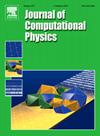Positivity-preserving new low-dissipation central-upwind schemes for compressible Euler equations
IF 3.8
2区 物理与天体物理
Q2 COMPUTER SCIENCE, INTERDISCIPLINARY APPLICATIONS
引用次数: 0
Abstract
One major challenge in developing accurate and robust numerical schemes for compressible Euler equations arises due to the potential emergence of discontinuous structures in the solution. Recently proposed low-dissipation central-upwind (LDCU) schemes achieve sharp resolution of these structures without introducing spurious oscillations. However, unlike many other Godunov-type methods, the LDCU schemes cannot be written as a convex combination of first-order positivity-preserving (PP) schemes. Therefore, the PP property of the LDCU schemes cannot be analyzed by standard techniques. In this paper, we overcome this difficulty by first decomposing the studied schemes into a convex combination of several intermediate solution states, and then analyzing their PP properties. The performed analysis helps us to construct PPLDCU schemes for Euler equations of compressible gas dynamics, guaranteeing the positivity of computed density and pressure. To achieve the PP property, the built-in anti-diffusion terms in the two-dimensional case and the piecewise linear reconstruction procedure in both the one- and two-dimensional cases are redesigned. The effectiveness and robustness of the proposed PPLDCU schemes are demonstrated in several challenging numerical examples.
保正的可压缩欧拉方程新低耗散中心迎风格式
为可压缩欧拉方程开发精确和鲁棒的数值格式的一个主要挑战是由于解中可能出现不连续结构。最近提出的低耗散中央迎风(LDCU)方案在不引入杂散振荡的情况下实现了这些结构的清晰分辨率。然而,与许多其他godunovo型方法不同,LDCU格式不能写成一阶保正(PP)格式的凸组合。因此,LDCU方案的PP特性无法用标准技术进行分析。在本文中,我们首先将所研究的方案分解为若干中间解状态的凸组合,然后分析它们的PP性质,从而克服了这一困难。所做的分析有助于我们构建可压缩气体动力学欧拉方程的PPLDCU格式,保证了计算密度和压力的正性。为了实现PP特性,重新设计了二维情况下的内置反扩散项和一维和二维情况下的分段线性重建程序。通过几个具有挑战性的数值算例验证了所提出的PPLDCU方案的有效性和鲁棒性。
本文章由计算机程序翻译,如有差异,请以英文原文为准。
求助全文
约1分钟内获得全文
求助全文
来源期刊

Journal of Computational Physics
物理-计算机:跨学科应用
CiteScore
7.60
自引率
14.60%
发文量
763
审稿时长
5.8 months
期刊介绍:
Journal of Computational Physics thoroughly treats the computational aspects of physical problems, presenting techniques for the numerical solution of mathematical equations arising in all areas of physics. The journal seeks to emphasize methods that cross disciplinary boundaries.
The Journal of Computational Physics also publishes short notes of 4 pages or less (including figures, tables, and references but excluding title pages). Letters to the Editor commenting on articles already published in this Journal will also be considered. Neither notes nor letters should have an abstract.
 求助内容:
求助内容: 应助结果提醒方式:
应助结果提醒方式:


